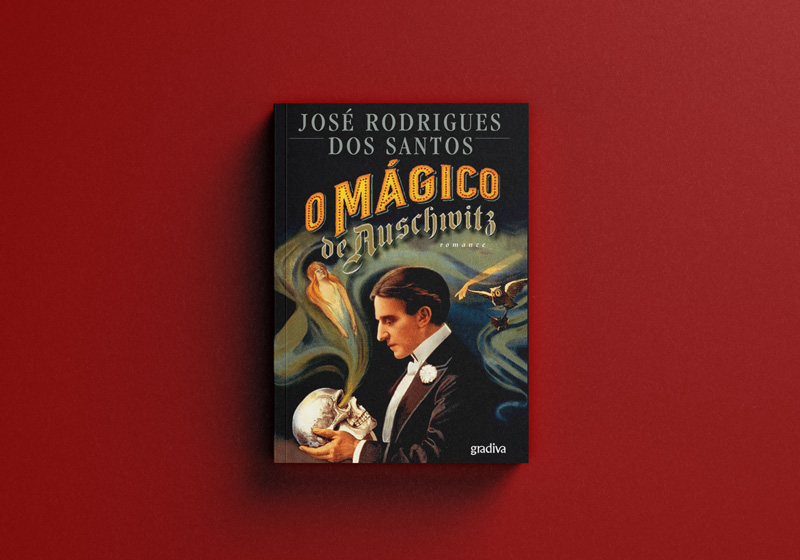Interview The Magician of Auschwitz for Sábado
- How did you develop the idea for this novel and how long did it take for you to write it? I heard it was when you met Werner Reich that you learned about the Great Nivelli…
JRS: Magician Luís de Matos invited me a few years ago to his TV show. The moment I was about to step in, they sat a 90-year-old man by my side and told me he was another guest of the programme. It was Werner Reich. I was surprised to hear about his age, because he was physically and mentally in great shape. I was even more surprised when Werner explained on stage that he had learned of illusionism in Auschwitz, where he had met a great magician in those days. Next day, I met Werner for breakfast in the hotel, we started talking and… The Magician of Auschwitz was born.
- Do you have any personal connection to the Jews?
JRS: I have a connection to Jews shared by all Portuguese people. Genetic studies show that the most dominant genes in the Portuguese population are Jewish. It seems 40% of our genes are Hebrew, a much higher percentage than our Lusitanian, Celt, Visigoth or Roman genes. Mind you, 40% is almost half. So, we all are half Jews. This is not what they taught us at school, but that is what genetic studies are showing. It seems that most Jews did not leave Portugal because of the Inquisition after all. Rather, they merged with the rest of the population. We are the product of that.
- Why did you split the book into two parts, leaving the most riveting part of the story, that of Nivelli performing magic in the camp, to the end?
JRS: This felt natural and necessary, as a result of the structure of the story. The plot grows in tension. When you read The Magician of Auschwitz, we first get the impression that this is a typical Holocaust story. However, you soon realise there is a new perspective, showing you an Auschwitz that has never been shown before in fiction. This is the challenge of this literary project: to show Auschwitz as we never saw it before. To bring you, the reader, to Auschwitz in 1944. As if you were there. As if you live there. One does not need to exaggerate anything, invent anything, dramatize anything. Just show it as it was.
- How did you balance the fictional and historical aspects in the story?
JRS: With small exceptions, all characters are based on real people and all situations presented are based on real events. This is part of the challenge of taking the reader to those days and that particular place. I’ve noticed that literature about Auschwitz includes a fair amount of fantasy about what happened there. I thought we needed something different. A raw and truthful book. That is what The Magician of Auschwitz is all about.
- Did you have any doubts in the process?
JRS: Oh, sure, I had them. In fact, when I finished my research, I even made the decision of not writing the novel at all. I became aware that this is one of those instances where reality is worse than anything imagination could conceive and I thought readers were not ready for such a book. But then I reconsidered. I thought it wasn’t really important whether readers could or could not read the novel. What mattered was that I would write it and, in doing so, I would do justice to what had really happened. This was not a book I wanted to write, this was a book I had to write.
- Did you feel you were walking on too delicate a field that forced you to stick to what had really happened, without leaving much room for the imagination?
JRS: Imagination is there, because it’s not possible to write fiction without it, but imagination is working in this case for reality. To reconstruct a historical event, you need to imagine it. In truth, writing this novel did not give free rein to the imagination. A dramatized historical reconstruction follows the events as they are known and imagination only fills what one does not know.
- I imagine you started with the facts. Only after establishing them, did you begin the writing process. Or did you first create the plot and then you searched for the historical details?
JRS: The book was borne out of many conversations I had with Werner Reich and subsequent research. It was the research that showed me what the story was. If this had not been the case, I would have been using Auschwitz to tell an imagined story. That’s not what I wanted to do at all. Imagination is nothing but a tool to recreate historical reality. Truth is the raison d’être of my novels. Telling the truth is my commitment as a writer. I am less interested in projects filled with fantasy but little reality. Literary writing must be soaked in truth. Literature is, and it can only be, truth wrapped in the clothes of fiction.
- Did you visit Prague, the Russian dachas and Auschwitz?
JRS: Yes, I did visit Prague and Russia. As for Auschwitz, my plan was to go there this Spring. However, as of March, the pandemic hit and as a result, travelling plans were cancelled.
- In the beginning, Levin appears to be a common man, but as the novel progresses, he is revealed as a great magician. Why was that?
JRS: The book begins with Levin’s human dimension. His art as a magician, though always present, is irrelevant to what happens to him and his family at this stage. Later his talents become central to the plot, owing a growth in importance to the Nazi obsession with occultism, a much-neglected subject in studies on the intellectual origins of National-Socialism.
- The Portuguese character, Francisco, comes across as a brute, a bloodthirsty fascist that had shown up already in two previous novels of yours. However, here he falls for a Russian girl and that gives him a new purpose in life: to save her. Do you believe love redeems people? Do you believe other people, even the worst criminal, have a good side to them? Does Hitler have a good side?
JRS: Spinoza would say there is no good nor bad, just things we value that we identify as ‘good’, and things we do not value, which we perceive as ‘bad’. The Nazis, believe it or not, thought the Holocaust was a ‘bad’ thing that they did in the name of a greater ‘good’. This was a typical rationale of zealots. We see the Inquisition thinking this way, we see jihadists thinking this way, we see the Communist regimes of Lenin, Stalin, Mao, Kim Il Sung and Pol Pot thinking this way, we see Hitler thinking this way too. Aleksandr Solzhenitsyn wrote in The Gulag Archipelago something that I used as an epigraphy of The Birkenau Scrolls, the sequel of The Magician of Auschwitz: “To do evil, the first necessary condition is to believe one is doing good”. Torquemada thought all the evil he was doing was for a greater good, and the same believed Bin Laden, Lenin, Pol Pot, Hitler and all the great murderers of history. They believed they were “saving” humankind.
- Much has been written about the Holocaust, but never, or very little, about Portuguese involvement in it, certainly because Salazar opted for neutrality. Did you want to show it wasn’t so, that there were in fact Portuguese soldiers fighting for the Nazis?
JRS: I wanted to bring back to life a forgotten story, as I always try to do in my novels. There were Portuguese soldiers in the SS, and not only does our literature neglect to mention them, but our historians don’t even touch the subject. I thought it was high time to break that silence. Since there were Portuguese in the SS and such a fact remains unknown, I wrote a novel where one of the main characters is a Portuguese SS. From now on it’s not possible to ignore that subject anymore.
- There are two situations particularly interesting in the book, both sex-related: a description of the brothels and an unsuccessful meeting of Levin with his wife in the latrines. By showing both situations in a contrasting manner, you point out that sexual life in the campus is a sort of luxury: only the privileged, the ones with basic needs satisfied, could have it. Does this have scientific support? Why did you stress this?
JRS: For no particular reason apart from the desire to show the reality of life in Auschwitz. There was a brothel in the camp for well-behaved prisoners. Apparently the National-Socialists got that idea from Communist concentration camps. And yes, Jewish prisoners led a sexual life in Auschwitz. This is well-established by historians and, naturally, it was an important side to the life of prisoners as human beings. So, I could not ignore it.
- Beyond Portuguese involvement and the story of the Jewish uprising in the camp, there is another subject you touch on which is little known: the Nazi obsession with occultism and magic. Do you think this kind of stuff enhances general interest in the novel?
JRS: This is a subject experts on National-Socialism are only now taking seriously. The main intellectual sources of Nazism, namely Nationalism, Socialism, Racism and Eugenics, are well-studied and well-researched. But not its mysticism. For a long time it was thought that occultism was nothing but a weird feature of National-Socialism. Now, however, historians begin to realize that in fact it played a central role in the whole ideology, including the concept of the extermination camps. Since this was a novel about a magician in Auschwitz, it made sense to deepen the connection of Nazi ideology to occultism and its vision that only by exterminating ‘sub-humans’ would it be possible to recover the long-lost divine sparkle of human beings and thus save humankind. The SS chief, Himmler, belonged to an esoteric movement called the League of the Artamanen, the very same organization to which belonged the creator and commander of Auschwitz, Rudolf Hoess. The SS saw themselves as an initiatory order, deeply embedded in oriental mysticism, and they even had a unit, the Ahnenerbe, that organized expeditions of esoteric research. Remnants of these ideas can still be seen in the attraction many people feel to oriental mysticism. Part of Nazi esotericism was also linked to the cult of nature. Nazis felt a strong connection to nature, to herbalism, to vegetarianism, ideas that survived and can be traced back to the Jugendbewegung, the 19th Century youth movement that also led to the hippies and the beatniks.
- You make very clear in the book that magic is nothing but illusion, not an occult science. Just tricks. You believe this, right? This means you don’t believe in the paranormal, in astrology, in tarot?
JRS: I’m quite spinozian over this. Paranormal is simply the normal we do not understand. The laws of nature do not change under any circumstance. They may however produce effects unknown to us. If a caveman saw a TV set he would think it was magic, but TV sets work without any breaching of the laws of nature.
- Did you learn any magic tricks? Do you think you might have a talent for them?
JRS: To each magician its art. Illusionism is for David Copperfield and Luís de Matos. My only magic lies in the way I use words and imagination to recreate a place and an age.
- Great stories have the magic of surprising readers, don’t you think?
JRS: Magic is an illusion that brings about a marvelous effect. In that sense, yes, novels can be magic.
- Your novels are always based on facts. Does research give you a kick? Is this a result of your journalistic background?
JRS: It’s quite possible that my love for facts is indeed a result of my journalistic background. However, I do think this is the most important role of literature too. Some writers think the strength of literature lies in word playing and stylistic panache. I do not agree. Words and style are certainly immensely important, no question about that, but they are so as a tool to say something. The essence of literature lies in what we have to say. If a novel is able to open windows in our mind and make us see what was hidden to us, then it’s a great novel. “I think we ought to read only books that wound or stab us”, wrote Kafka. “If the book we are reading doesn’t wake us up with a blow on the head, what are we reading it for?” This is exactly how I see literature. If The Magician of Auschwitz wakes us up with a blow on the head, what more could I wish for as a writer?
- Have you considered writing a totally made up story taking place today? Would it be easier or more difficult for you?
JRS: This is to a certain extent what I already do with the Tomás Noronha novels. Each adventure that Tomás embarks on, takes place today and its subjects are always contemporary. The existence of God in The Einstein Enigma, climate change in The Seventh Seal, what happens when we die in The Key of Solomon, jihadism in The Wrath of God, corruption in the Catholic Church in Vaticanum, life in the universe in Signal of Life, the future of humankind in Immortal. You do not find anything more contemporary than this. So contemporary, in fact, that the latest printing of Immortal is updated with information regarding the Covid-19 pandemic. A completely fictionalized story is something that does not interest me. What I want is to use fiction to express reality. What bigger or nobler mission could a writer set for himself?



